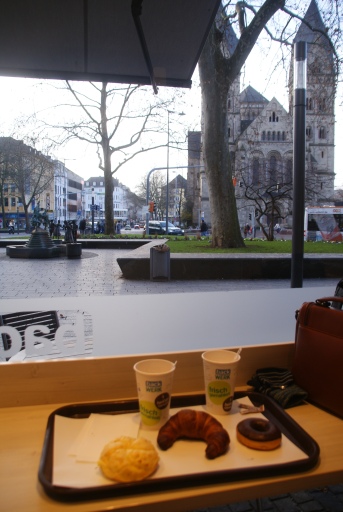If you’re planning to travel to Europe this year, you may be wondering how to keep your wallet happy without letting your stomach get too grumbly.
We’ve started to put together a list of ways to save money while traveling in Europe, and here is the result! Although we haven’t reached 105 yet, we plan on continuing to add new ways to save money. This post will be constantly updated with the latest ways to budget your way through Europe, and we’re hoping that YOU, our dear readers, will help us to do that!
If you have a great budget-hack for Europe travel, let us know in the comments and we’ll add your suggestion to our list! Thanks in advance for your help!
Planes, Trains, and Automobiles:
1. Travel Light and Low-Cost
Low-cost airlines get you where you want to be in Europe for a much cheaper price. Going through Ryanair or EasyJet will save you money on your flights around Europe.
However, be warned: where these budget airlines make up their money is by their excessive baggage fees. Any checked luggage could cost you around 50 Euros.
The solution? Pack light! If you travel with a carryon or backpack, you’ll be able to really take advantage of the cheapest flights!
2. Try an Open Jaw Flight
This concept is a relatively new one, but it is really starting to pick up speed. Let’s imagine you want to visit more than one European city during your trip, for example Barcelona and Madrid. To make your trip open jaw, you would fly from your starting point to Barcelona, then fly back to your starting point from Madrid.
Strangely enough, these multi-city flights will actually cost you less than flying from the same airport. So for less money, you get to experience more of what Europe has to offer!
Pep and I recently tried this on a trip to Germany. We flew from Malaga, Spain to Frankfurt, Germany, then took our return flight from Cologne. By doing this, we saved about 50 Euros!
3. Use Public Transportation
This is one of the biggest money-savers in European travel. Using public transportation (or your own two feet!) is one of the easiest ways to get around in Europe, whether traveling within a city or to different European destinations.
Eurail is a company that lets you book train tickets to multiple countries, allowing you to enjoy different destinations. Busses are another way to travel between European countries. Just head to the local bus station and you’ll see where the trains go (you may want to visit a day or two in advance of your bus trip.)
To explore any European city, I highly recommend walking as much as possible! Most of these cities are really set up for walking or cycling, and it’s easy to get around. Renting a car is really not necessary in Europe, because public transportation is very well organized. You can get anywhere you need to go, and normally it’s pretty cheap!
All Things Food:
4. Adhere to the 4-Block Rule
Well, maybe it’s not a rule, but it seems like a good idea. When eating out, try to avoid restaurants that are within a close radius (approximately 4 blocks) of a tourist attraction. Normally, anything set close to a tourist attraction will be a tourist trap. They’ll serve mediocre food at high prices and you’ll be left with a disappointed tongue and a sad wallet.
This is not always the case, but it seems to be pretty common. A good rule of thumb is to get off the main road, and watch for where the locals are eating. (They know what’s good in their city.)
5. Make the Most of Local Shops

Let’s talk more about food. Local bakeries provide some of the most delicious foods in many European countries, giving either a cheap breakfast or a light lunch. So keep on the lookout for a panadería in Spain, a padaria in Portugal, a pâtisserie in France, or a bäckerei in Germany.
Another great option is local supermarkets. If you’re staying in an apartment or a guesthouse, you may have access to a kitchen. Getting your own food from the supermarket and cooking a few of your own meals will cut down your costs extensively.
If you don’t have a kitchen, you can still buy a simple meal that doesn’t require cooking. For example, in Spain you might get:
2 baguettes- 1 Euro
Premade salad- 1.50 Euro
Spanish cured ham (jamon)- ~2 Euro per package
Assorted fruit- 1.50 Euro
Total: 6 Euros for a simple meal for two people! You really can’t beat that!
Timing Is Everything:
6. Summer Fun = Summer Pricing
Summer in Europe is absolutely not recommended for budget travelers. The months of June, July and August are the most expensive in the year for almost all European cities, and in countries like Spain, Greece, or Portugal, the heat makes touring through cities unbearable.
But what if you were hoping for a lovely summer holiday by the beach in southern Spain? Here’s our insider tip: come in September! The end of September will still give you lovely summer weather, but since the tourist season is cooling down you’ll have the beaches practically to yourself! (May is also another option for beach vacations in Spain, but the Mediterranean waters will be warmer after summer rather than before.)
Budget-Friendly Activities:
7. Take Advantage of Free Museums
Museums are a great way to take in all the flair and life of the ancient European cities. Cities like Paris, London, Berlin, Madrid, Barcelona, and others all have free museums that you can visit, most of which are quite charming.
In fact, most of the best museums in London are actually free of charge! You can take in history at the British Museum, see the Apollo 10 command module at the London Science Museum, or view over 2,000 masterpieces at the National Gallery, all for free!
Beyond this, many of the more famous museums of the above cities also allow you to visit for free at certain times or days. For example, the Musee d’Orsay (my favorite museum in Paris) allows free visits every first Sunday of the month. If you have a particular museum you’d like to visit, check online to see when they have a free or discounted opening.
Communicating Abroad:
8. Unlock Your Phone
Roaming charges are no fun, and you definitely don’t want to be worrying about how much your calls are costing. A good solution is to get an unlocked phone for travel in Europe, and pick up a cheap SIM card while you’re there. Lycamobile offers very cheap plans (as low as 5 Euro per month), and you can use their SIM cards in most of Europe.
9. Communicate With Home via WiFi
Especially if you’re from outside the European Union, this is important. Communication with home can get very expensive, very quickly. That’s why it’s better to talk using apps such as Whatsapp, Viber, Skype, or Facetime (for Apple users). Make sure you and your loved ones have at least one of these apps in common, and you can talk wherever there’s WiFi!
Free WiFi is available in almost all European hotels. In Spain, most cafes also offer free WiFi (you may just need to ask for the password). In certain cities, like Paris, the government has set up free WiFi zones in parks, squares, libraries, and more!
So here are our first budget travel tips! I’ll keep updating this page, so make sure to keep checking for the latest ways to save money in Europe.
Do you have your our European budget travel tips? Let us know in the comments and we’ll add your ideas to our list!

You can save a lot of money by staying in youth hostels. Apart from the traditional dorm rooms, many youth hostels now have double and family rooms, often with en-suite bathrooms. They’re a lot cheaper than hotels, especially in expensive cities like London, Paris and Rome…and you can buy food in a supermarket and prepare your own simple meals in the youth hostel’s kitchen, saving you more money.
LikeLike
Thanks so much for that insight! I definitely agree, hostels are a great place to stay if you want to save money, there are so many advantages!
LikeLike